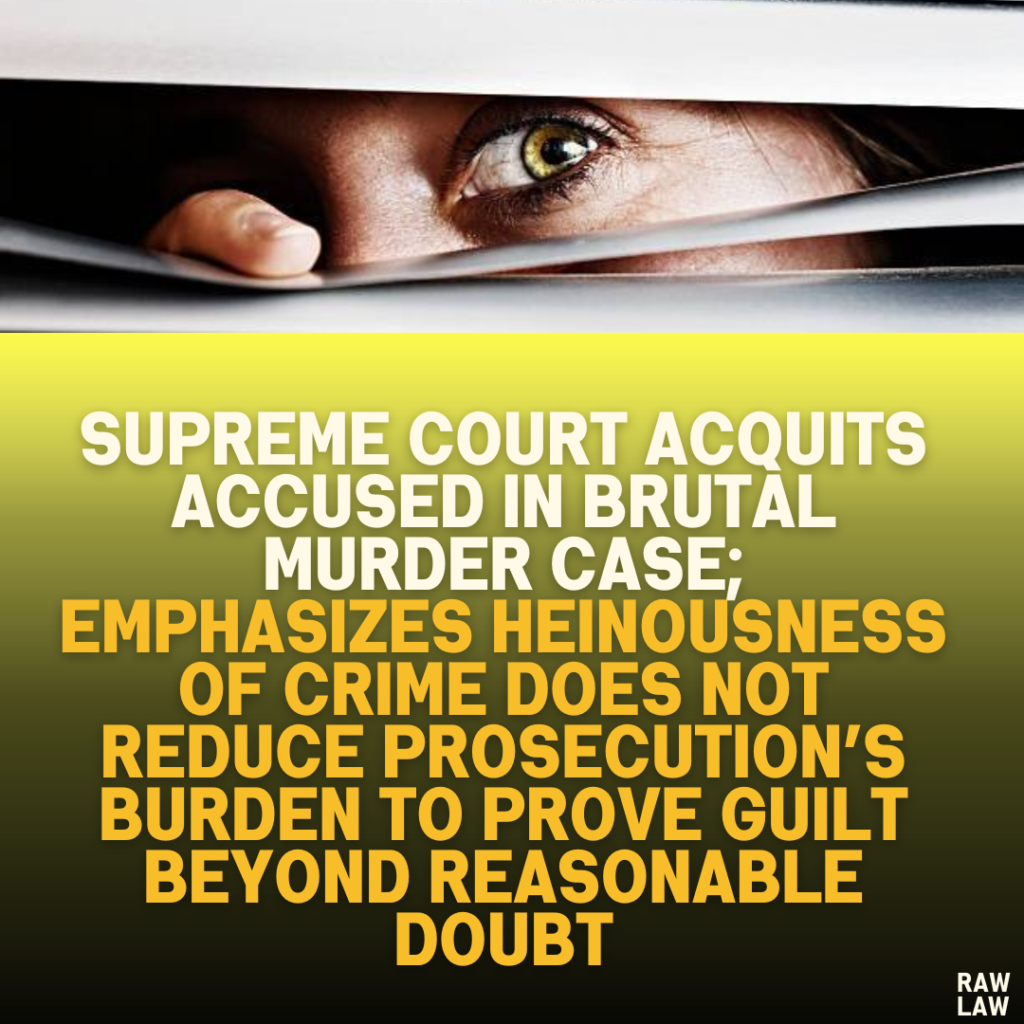Court’s Decision:
The Supreme Court overturned the convictions of the accused in a brutal murder case, finding that the prosecution failed to provide legally admissible evidence proving guilt beyond a reasonable doubt. The appellants were acquitted, and their immediate release was ordered unless they were required in connection with other cases.
Facts:
- The Incident:
- The case involved the abduction and murder of Gurpal Singh, who was last seen leaving his sister’s house in his car.
- Witnesses claimed he was abducted by unknown individuals traveling in a white car. His torso and other body parts were later recovered from a canal.
- Prosecution Evidence:
- The prosecution presented circumstantial evidence, testimony of an alleged eyewitness (PW-26), CCTV footage purportedly showing the crime, and the recovery of articles such as the deceased’s driving license.
- Eight accused were charged; while the Sessions Court convicted all, the High Court acquitted all except the appellants.
- Defendants’ Stance:
- The appellants consistently denied the allegations, arguing that the evidence presented was inadmissible or unreliable.
Issues:
- Was the evidence sufficient to prove the appellants’ guilt beyond reasonable doubt?
- Were the procedural requirements for admitting CCTV footage and recovery evidence satisfied?
- Did the prosecution fulfill the legal requirements for establishing a complete chain of circumstantial evidence?
Petitioner’s Arguments:
- Eyewitness Testimony (PW-26):
- The appellants argued that the testimony was unreliable, pointing to significant omissions in her statements to the police.
- PW-26 did not participate in a test identification parade and failed to ascribe specific roles to the accused during her testimony.
- CCTV Footage:
- The CD of the footage was inadmissible as it lacked the mandatory certificate under Section 65B of the Indian Evidence Act, which ensures the authenticity of electronic records.
- Reliance on Confessions:
- The appellants highlighted that the prosecution relied on confessions made in police custody, which are inadmissible under Sections 25 and 26 of the Indian Evidence Act.
- Recovery Evidence:
- They contended that recovery evidence alone could not sustain a conviction without corroboration.
Respondent’s Arguments:
- Eyewitness Credibility:
- The State defended PW-26’s testimony as natural and credible, arguing that her identification of the accused in court carried weight.
- Circumstantial Evidence:
- The prosecution claimed that the chain of circumstances—CCTV footage, recovery of incriminating articles, and the evidence of motive—was sufficient to prove guilt.
- Brutality of Crime:
- The gruesome nature of the offence warranted the upholding of convictions to ensure justice.
Analysis of the Law:
1. Admissibility of Evidence:
- CCTV Footage:
- Under Section 65B of the Evidence Act, a certificate authenticating electronic records is mandatory. This was not produced, rendering the CD inadmissible.
- Witnesses who created the CD admitted they neither authenticated it nor ensured it was tamper-proof.
- Eyewitness Testimony:
- PW-26’s statements had numerous omissions and contradictions compared to her initial police statement. The Court found her testimony unreliable.
- She failed to identify the accused with specificity or link them to the crime conclusively.
- Recovery Evidence:
- The Court emphasized that recovery evidence must be corroborated and cannot solely form the basis of conviction unless it satisfies Section 27 of the Evidence Act.
2. Circumstantial Evidence:
- The Court referred to Sharad Birdhichand Sarda v. State of Maharashtra (1984), which laid down five essential conditions for proving guilt through circumstantial evidence:
- Circumstances must be fully established.
- They must point exclusively to the guilt of the accused.
- They must be conclusive and exclude every other hypothesis of innocence.
- A complete chain of evidence must leave no reasonable doubt about guilt.
- Suspicion, however strong, cannot replace proof.
- The Court held that the prosecution failed to establish a complete chain of circumstances. Key evidence, including the alleged CCTV footage and eyewitness testimony, was inadmissible or unreliable.
3. Inadmissible Confessions:
- Sections 25 and 26 of the Evidence Act prohibit the use of confessions made to the police. While Section 27 permits certain disclosures if they lead to the discovery of facts, the prosecution relied on broad and inadmissible confessions.
4. Judicial Caution Against Moral Convictions:
- The Court reiterated the principle from Subhash Chand v. State of Rajasthan (2002) that convictions must be based on legal evidence, not moral conjectures.
Precedent Analysis:
- Sharad Birdhichand Sarda (1984): Established principles for circumstantial evidence.
- Pulukuri Kotayya (1947): Clarified the scope of admissibility under Section 27.
- Subhash Chand (2002): Warned against moral convictions based on gruesome crimes.
Court’s Reasoning:
- Unreliable Evidence:
- The Court found PW-26’s testimony full of significant contradictions and omissions. Her failure to identify the accused undermined the prosecution’s case.
- The recovery of articles and alleged CCTV footage did not meet the evidentiary standards required for admissibility.
- Brutality Does Not Reduce Burden of Proof:
- While acknowledging the brutality of the offence, the Court emphasized that the standard of proof in criminal trials remains “beyond a reasonable doubt.”
- Failure of the Prosecution:
- With the circumstantial evidence incomplete, the prosecution failed to conclusively prove the appellants’ involvement.
Conclusion:
- The Court acquitted the appellants, stating that their guilt was not proven beyond a reasonable doubt. It quashed the judgments of the Sessions Court and High Court, ordering the appellants’ release unless involved in other cases.
Implications:
- This judgment reinforces the necessity of adhering to evidentiary and procedural standards, even in cases involving heinous crimes. It underscores the principle that convictions must be based on legally admissible evidence and beyond a reasonable doubt, ensuring fairness in the criminal justice system.
